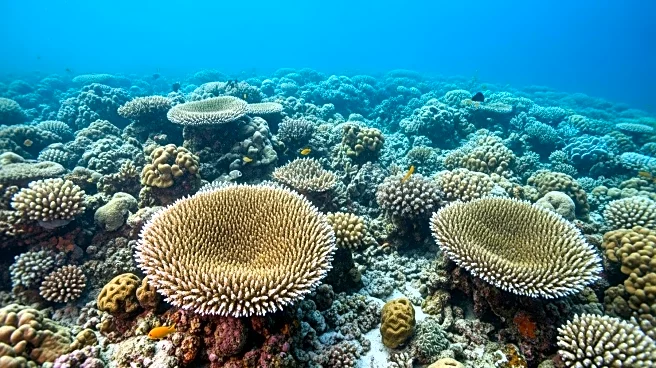What's Happening?
A recent surge in ocean temperatures has led to widespread bleaching and death among warm-water corals globally, marking the first climate tipping point for an ecosystem, according to scientists. The bleaching event, triggered by record-breaking global temperatures since 2023, has affected over 80% of the world's corals. Coral bleaching occurs when corals expel algae living in their tissues due to high water temperatures, leaving them vulnerable to disease and potentially leading to their death. This event has been described as unprecedented in magnitude, with coral reefs now facing an 'unprecedented crisis.' The Global Tipping Points Report 2025, compiled by 160 scientists, highlights that warm-water corals are the first Earth system to cross into their tipping point, posing significant risks to marine biodiversity and human health.
Why It's Important?
Coral reefs are vital to marine biodiversity, supporting up to one-third of all known marine species. They provide essential services such as food, coastal protection, and income for up to a billion people worldwide, contributing approximately $9.9 trillion annually in goods and services. The collapse of coral reefs could lead to significant economic and ecological consequences, affecting industries reliant on marine resources and tourism. The report emphasizes the urgent need for global temperature reduction to prevent further damage, highlighting the importance of rapid greenhouse gas emission cuts. The situation underscores the broader challenges of climate change and the need for immediate action to mitigate its impacts.
What's Next?
The best hope for saving coral reefs lies in reducing global average temperatures to 1.2°C above pre-industrial levels. Scientists stress the need for urgent action from world leaders at the upcoming COP30 summit in Brazil to accelerate emissions cuts. The report suggests that rapid adoption of cleaner technologies, such as renewable energy and electric vehicles, could help achieve necessary emissions reductions. However, achieving these ambitious goals remains uncertain, requiring unprecedented global cooperation and policy changes.
Beyond the Headlines
The decline of coral reefs is part of a broader pattern of environmental tipping points, including the potential collapse of the Amazon rainforest and polar ice sheets. These events could occur at warming levels below 2°C, highlighting the interconnected nature of global ecosystems. Positive tipping points, such as the growth of renewable energy, offer hope for mitigating climate risks. The situation calls for a reevaluation of global environmental policies and increased investment in sustainable practices.










